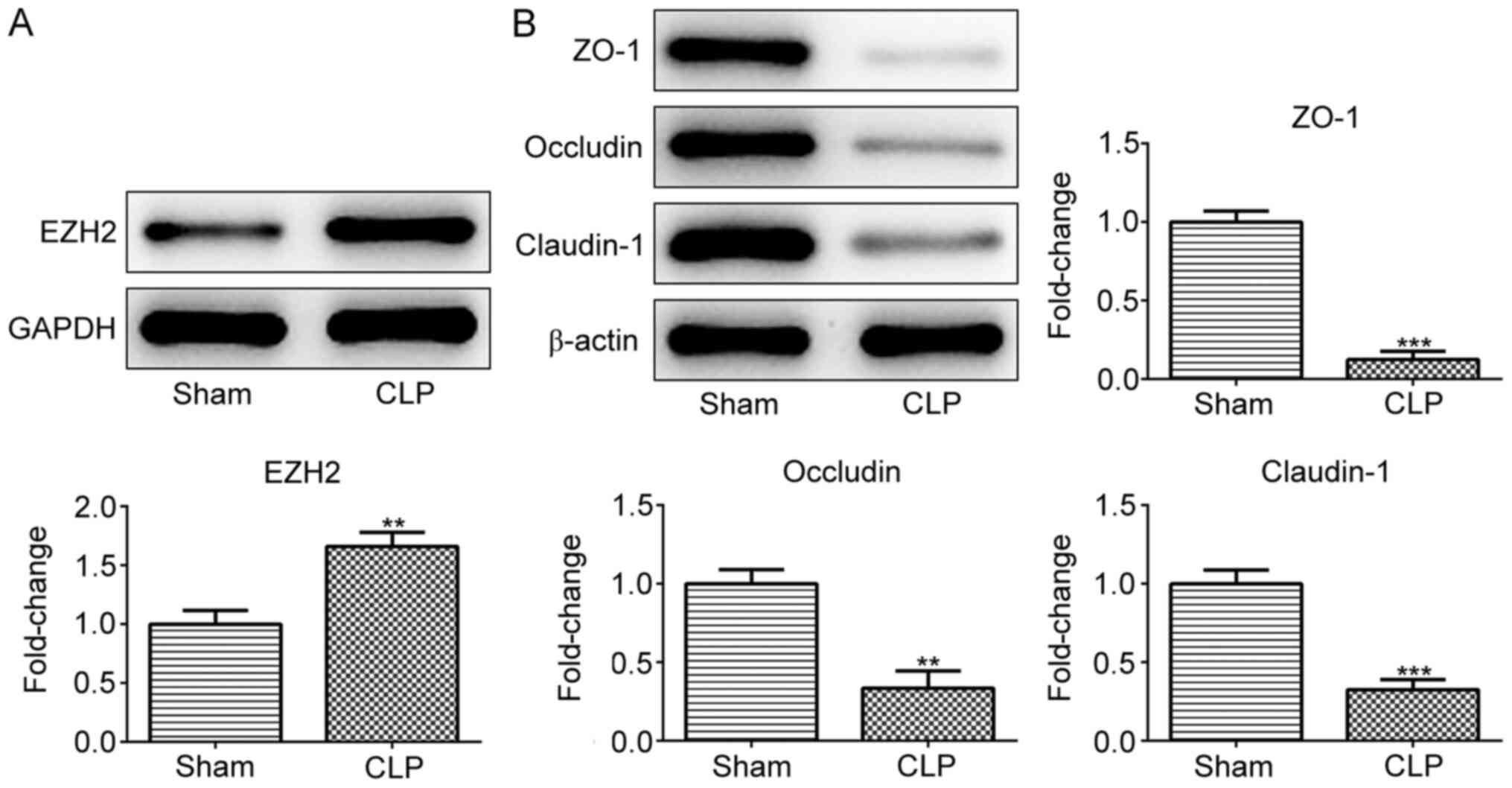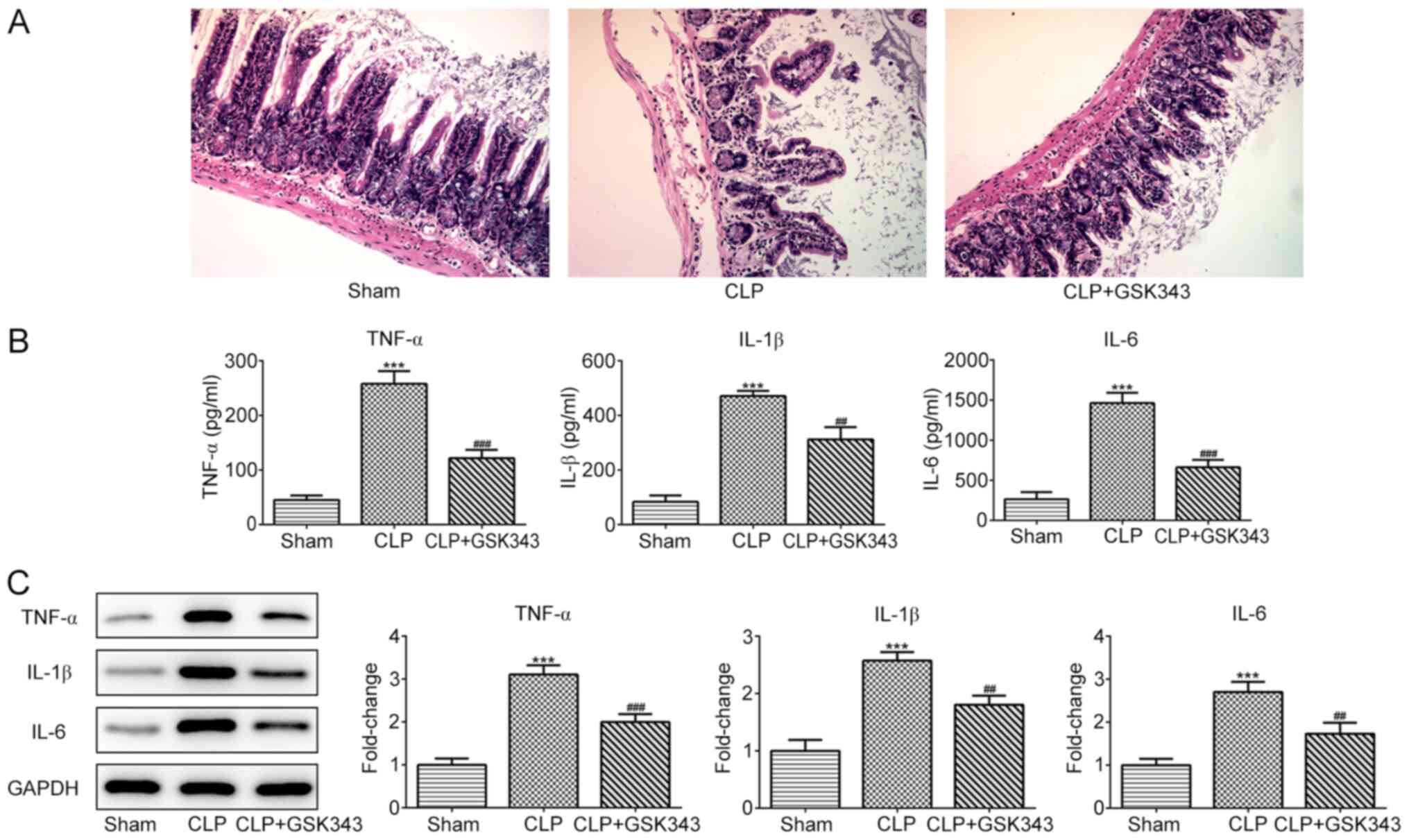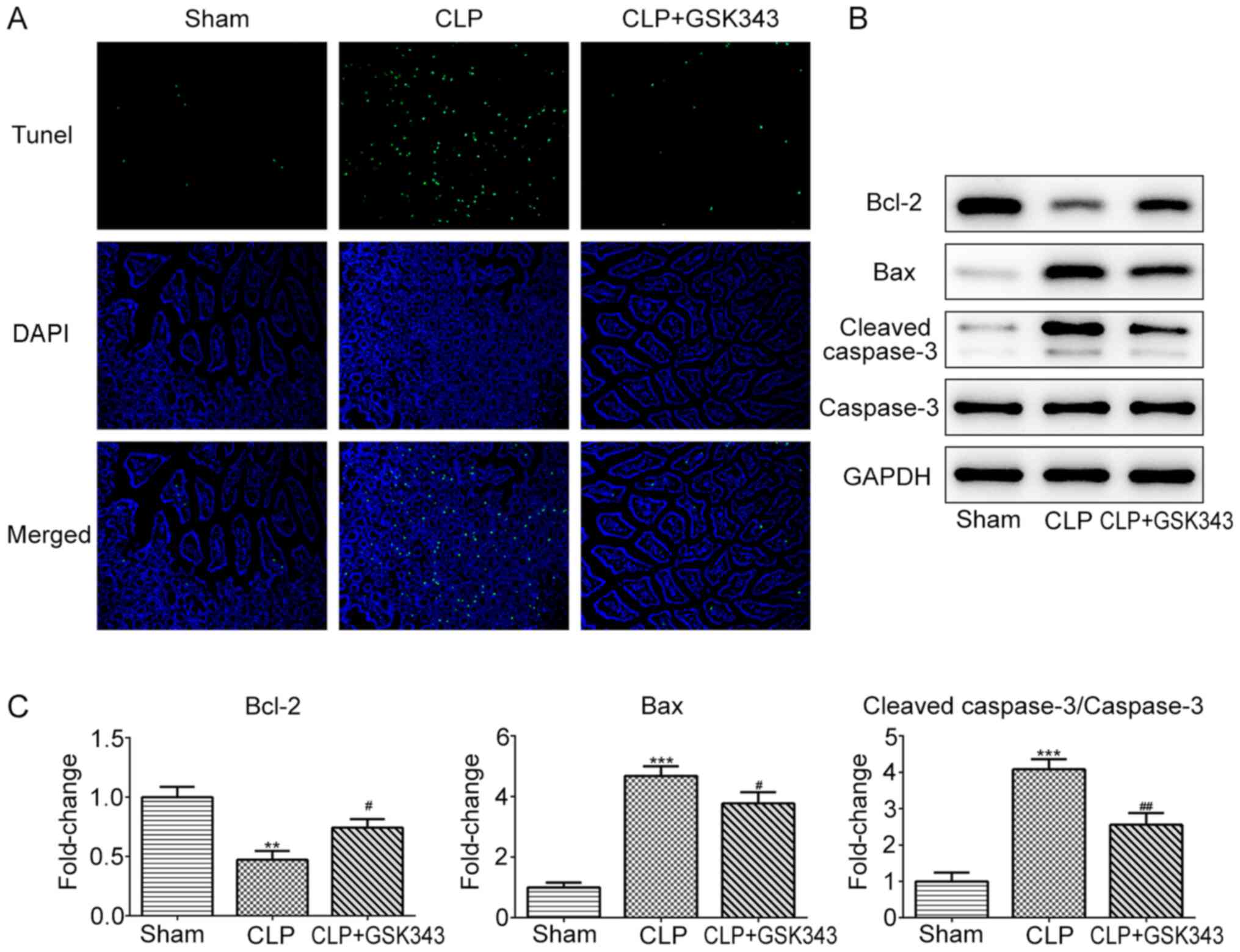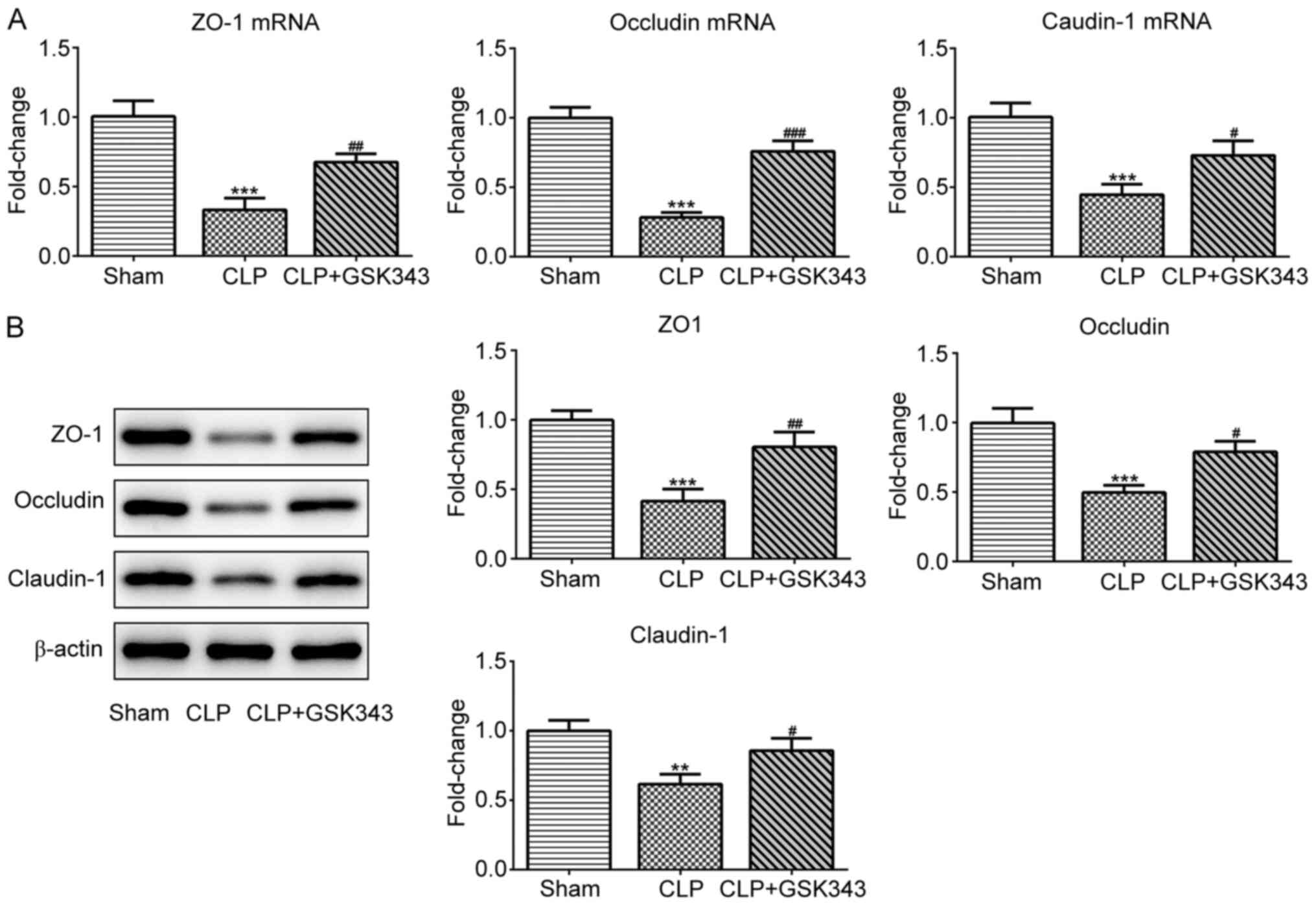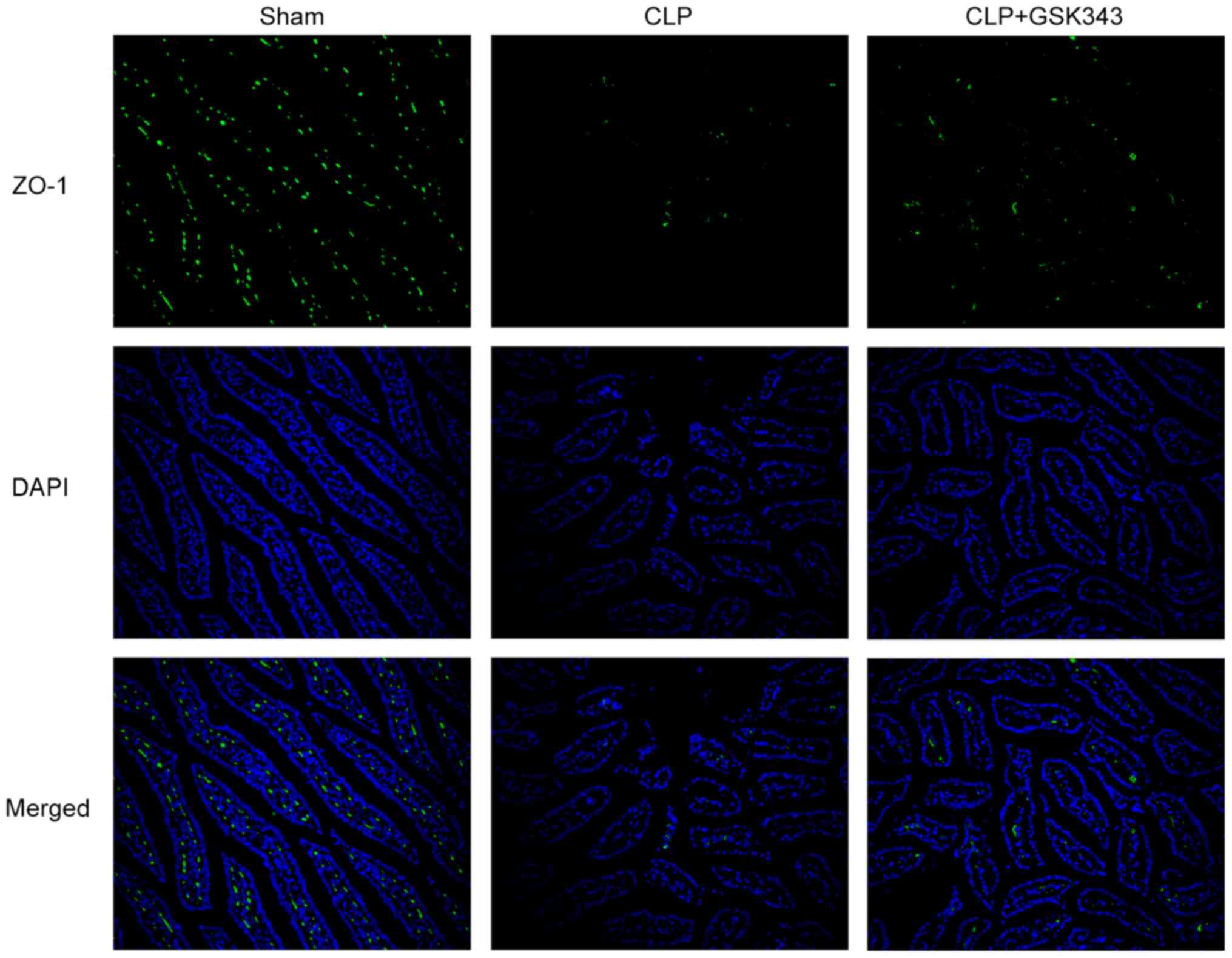|
1
|
Hotchkiss RS, Moldawer LL, Opal SM,
Reinhart K, Turnbull IR and Vincent JL: Sepsis and septic shock.
Nat Rev Dis Primers. 2(16045)2016.PubMed/NCBI View Article : Google Scholar
|
|
2
|
Fleischmann C, Scherag A, Adhikari NK,
Hartog CS, Tsaganos T, Schlattmann P, Angus DC and Reinhart K:
International Forum of Acute Care Trialists. Assessment of global
incidence and mortality of hospital-treated sepsis. Current
estimates and limitations. Am J Respir Crit Care Med. 193:259–272.
2016.PubMed/NCBI View Article : Google Scholar
|
|
3
|
Rello J, Valenzuela-Sánchez F,
Ruiz-Rodriguez M and Moyano S: Sepsis: A review of advances in
management. Adv Ther. 34:2393–2411. 2017.PubMed/NCBI View Article : Google Scholar
|
|
4
|
Lelubre C and Vincent JL: Mechanisms and
treatment of organ failure in sepsis. Nat Rev Nephrol. 14:417–427.
2018.PubMed/NCBI View Article : Google Scholar
|
|
5
|
Mowat AM and Agace WW: Regional
specialization within the intestinal immune system. Nat Rev
Immunol. 14:667–685. 2014.PubMed/NCBI View
Article : Google Scholar
|
|
6
|
Brown EM, Sadarangani M and Finlay BB: The
role of the immune system in governing host-microbe interactions in
the intestine. Nat Immunol. 14:660–667. 2013.PubMed/NCBI View
Article : Google Scholar
|
|
7
|
Fay KT, Ford ML and Coopersmith CM: The
intestinal microenvironment in sepsis. Biochim Biophys Acta Mol
Basis Dis. 1863:2574–2583. 2017.PubMed/NCBI View Article : Google Scholar
|
|
8
|
Hwang JS, Kim KH, Park J, Kim SM, Cho H,
Lee Y and Han IO: Glucosamine improves survival in a mouse model of
sepsis and attenuates sepsis-induced lung injury and inflammation.
J Biol Chem. 294:608–622. 2019.PubMed/NCBI View Article : Google Scholar
|
|
9
|
Hu Q, Ren H, Li G, Wang D, Zhou Q, Wu J,
Zheng J, Huang J, Slade DA, Wu X and Ren J: STING-mediated
intestinal barrier dysfunction contributes to lethal sepsis.
EBioMedicine. 41:497–508. 2019.PubMed/NCBI View Article : Google Scholar
|
|
10
|
Zhou Q and Verne GN: Intestinal
hyperpermeability: A gateway to multi-organ failure? J Clin Invest.
128:4764–4766. 2018.PubMed/NCBI View Article : Google Scholar
|
|
11
|
Tremblay-LeMay R, Rastgoo N, Pourabdollah
M and Chang H: EZH2 as a therapeutic target for multiple myeloma
and other haematological malignancies. Biomark Res.
6(34)2018.PubMed/NCBI View Article : Google Scholar
|
|
12
|
Margueron R and Reinberg D: The Polycomb
complex PRC2 and its mark in life. Nature. 469:343–349.
2011.PubMed/NCBI View Article : Google Scholar
|
|
13
|
Gan L, Yang Y, Li Q, Feng Y, Liu T and Guo
W: Epigenetic regulation of cancer progression by EZH2: From
biological insights to therapeutic potential. Biomark Res.
6(10)2018.PubMed/NCBI View Article : Google Scholar
|
|
14
|
Zhang Q, Sun H, Zhuang S, Liu N, Bao X,
Liu X, Ren H, Lv D, Li Z, Bai J, et al: Novel pharmacological
inhibition of EZH2 attenuates septic shock by altering innate
inflammatory responses to sepsis. Int Immunopharmacol.
76(105899)2019.PubMed/NCBI View Article : Google Scholar
|
|
15
|
Cazorla SI, Maldonado-Galdeano C, Weill R,
De Paula J and Perdigón GD: Oral administration of probiotics
increases paneth cells and intestinal antimicrobial activity. Front
Microbiol. 9(736)2018.PubMed/NCBI View Article : Google Scholar
|
|
16
|
Livak KJ and Schmittgen TD: Analysis of
relative gene expression data using real-time quantitative PCR and
the 2(-Delta Delta C(T)) method. Methods. 25:402–408.
2001.PubMed/NCBI View Article : Google Scholar
|
|
17
|
Chen S, He Y, Hu Z, Lu S, Yin X, Ma X, Lv
C and Jin G: Heparanase mediates intestinal inflammation and injury
in a mouse model of sepsis. J Histochem Cytochem. 65:241–249.
2017.PubMed/NCBI View Article : Google Scholar
|
|
18
|
Dokladny K, Zuhl MN and Moseley PL:
Intestinal epithelial barrier function and tight junction proteins
with heat and exercise. J Appl Physiol (1985). 120:692–701.
2016.PubMed/NCBI View Article : Google Scholar
|
|
19
|
Günzel D and Fromm M: Claudins and other
tight junction proteins. Compr Physiol. 2:1819–1852.
2012.PubMed/NCBI View Article : Google Scholar
|
|
20
|
Zeisel MB, Dhawan P and Baumert TF: Tight
junction proteins in gastrointestinal and liver disease. Gut.
68:547–561. 2019.PubMed/NCBI View Article : Google Scholar
|
|
21
|
Clevers HC and Bevins CL: Paneth cells:
Maestros of the small intestinal crypts. Annu Rev Physiol.
75:289–311. 2013.PubMed/NCBI View Article : Google Scholar
|
|
22
|
Schmitt M, Schewe M, Sacchetti A, Feijtel
D, van de Geer WS, Teeuwssen M, Sleddens HF, Joosten R, van Royen
ME, van de Werken HJ, et al: Paneth cells respond to inflammation
and contribute to tissue regeneration by acquiring stem-like
features through SCF/c-Kit signaling. Cell Rep. 24:2312–2328.e2317.
2018.PubMed/NCBI View Article : Google Scholar
|
|
23
|
Holly MK and Smith JG: Paneth cells during
viral infection and pathogenesis. Viruses. 10(225)2018.PubMed/NCBI View Article : Google Scholar
|
|
24
|
Han SJ, Kim M, D'Agati VD and Lee HT:
Norepinephrine released by intestinal Paneth cells exacerbates
ischemic AKI. Am J Physiol Renal Physiol. 318:F260–F272.
2020.PubMed/NCBI View Article : Google Scholar
|
|
25
|
Lee HT, Kim M, Kim JY, Brown KM, Ham A,
D'Agati VD and Mori-Akiyama Y: Critical role of interleukin-17A in
murine intestinal ischemia-reperfusion injury. Am J Physiol
Gastrointest Liver Physiol. 304:G12–G25. 2013.PubMed/NCBI View Article : Google Scholar
|
|
26
|
Gulati N, Béguelin W and Giulino-Roth L:
Enhancer of zeste homolog 2 (EZH2) inhibitors. Leuk Lymphoma.
59:1574–1585. 2018.PubMed/NCBI View Article : Google Scholar
|
|
27
|
Bai Y, Zhang Z, Cheng L, Wang R, Chen X,
Kong Y, Feng F, Ahmad N, Li L and Liu X: Inhibition of enhancer of
zeste homolog 2 (EZH2) overcomes enzalutamide resistance in
castration-resistant prostate cancer. J Biol Chem. 294:9911–9923.
2019.PubMed/NCBI View Article : Google Scholar
|
|
28
|
Jones BA, Varambally S and Arend RC:
Histone methyltransferase EZH2: A therapeutic target for ovarian
cancer. Mol Cancer Ther. 17:591–602. 2018.PubMed/NCBI View Article : Google Scholar
|
|
29
|
Pan YM, Wang CG, Zhu M, Xing R, Cui JT, Li
WM, Yu DD, Wang SB, Zhu W, Ye YJ, et al: STAT3 signaling drives
EZH2 transcriptional activation and mediates poor prognosis in
gastric cancer. Mol Cancer. 15(79)2016.PubMed/NCBI View Article : Google Scholar
|
|
30
|
Yamagishi M and Uchimaru K: Targeting EZH2
in cancer therapy. Curr Opin Oncol. 29:375–381. 2017.PubMed/NCBI View Article : Google Scholar
|
|
31
|
Yong H, Wu G, Chen J, Liu X, Bai Y, Tang
N, Liu L and Wei J: lncRNA MALAT1 accelerates skeletal muscle cell
apoptosis and inflammatory response in sepsis by decreasing BRCA1
expression by recruiting EZH2. Mol Ther Nucleic Acids. 19:97–108.
2020.PubMed/NCBI View Article : Google Scholar
|
|
32
|
Zhao D, Li Z, Liu X, Liu N, Bao X, Sun H,
Meng Q, Ren H, Bai J, Zhou X and Tang L: Lymphocyte expression of
EZH2 is associated with mortality and secondary infectious
complications in sepsis. Int Immunopharmacol.
89(107042)2020.PubMed/NCBI View Article : Google Scholar
|
|
33
|
Yong H, Wu G, Chen J, Liu X, Bai Y, Tang
N, Liu L and Wei J: lncRNA MALAT1 accelerates skeletal muscle cell
apoptosis and inflammatory response in sepsis by decreasing BRCA1
expression by recruiting EZH2. Mol Ther Nucleic Acids.
21:1120–1121. 2020.PubMed/NCBI View Article : Google Scholar
|
|
34
|
Yu Z, Rayile A, Zhang X, Li Y and Zhao Q:
Ulinastatin protects against lipopolysaccharide-induced cardiac
microvascular endothelial cell dysfunction via downregulation of
lncRNA MALAT1 and EZH2 in sepsis. Int J Mol Med. 39:1269–1276.
2017.PubMed/NCBI View Article : Google Scholar
|
|
35
|
Wang Q, Xu L, Zhang X, Liu D and Wang R:
GSK343, an inhibitor of EZH2, mitigates fibrosis and inflammation
mediated by HIF-1α in human peritoneal mesothelial cells treated
with high glucose. Eur J Pharmacol. 880(173076)2020.PubMed/NCBI View Article : Google Scholar
|
|
36
|
Liu Y, Peng J, Sun T, Li N, Zhang L, Ren
J, Yuan H, Kan S, Pan Q, Li X, et al: Epithelial EZH2 serves as an
epigenetic determinant in experimental colitis by inhibiting
TNFα-mediated inflammation and apoptosis. Proc Natl Acad Sci USA.
114:E3796–E3805. 2017.PubMed/NCBI View Article : Google Scholar
|
|
37
|
Nakanishi Y, Reina-Campos M, Nakanishi N,
Llado V, Elmen L, Peterson S, Campos A, De SK, Leitges M, Ikeuchi
H, et al: Control of paneth cell fate, intestinal inflammation, and
tumorigenesis by PKCλ/ι. Cell Rep. 16:3297–3310. 2016.PubMed/NCBI View Article : Google Scholar
|















